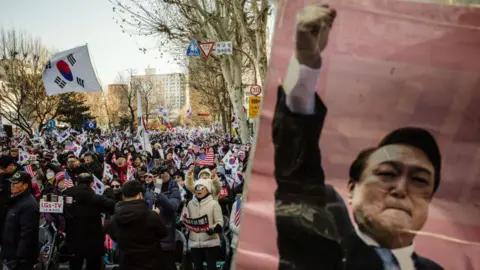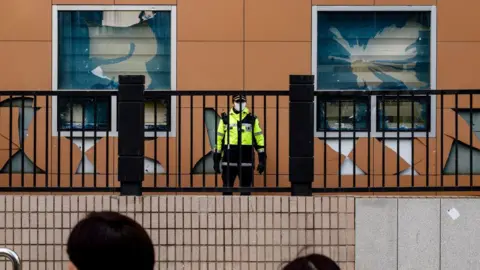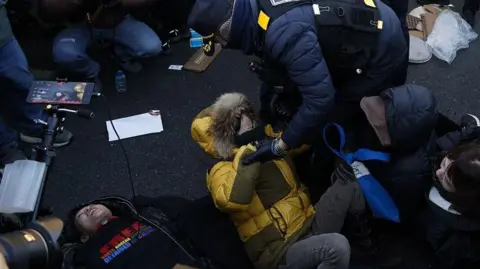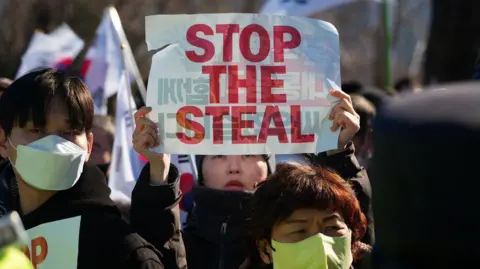South Korea's president is out - but he leaves behind a polarised country
 Getty Images
Getty ImagesPained cries rang out in front of former South Korean President Yoon Suk Yeol's official residence on Friday, as judges of the Constitutional Court judges confirmed his impeachment.
"I came here with hope in my heart, believing we would win ... It's so unfair," 64-year-old Won Bog-sil told BBC Korean from the rally, where thousands had gathered in support of Yoon.
These scenes were live streamed to thousands more on YouTube - a platform popular with not just Yoon's supporters but the president himself.
A disgraced Yoon is now stripped of his power, but he leaves behind an ever more divided South Korea.
Last December, Yoon's shock martial law declaration cost him the confidence of much of the country. But among his supporters, his ongoing legal troubles have only further buttressed the image of a wronged saviour.
Many of them echo narratives peddled by influential right-wing YouTubers who support Yoon: that martial law was necessary to protect the country from pro-North Korea opposition lawmakers and a dangerously powerful opposition, and that Yoon's conservative party was a victim of election fraud.
All this has culminated in a fringe movement that has become both more energised and extreme, spilling out from behind computer screens onto the streets.
"Stop the Steal" signs have become a fixture at pro-Yoon rallies - co-opted from supporters of US President Donald Trump, whose own political career has been helped by a network of conservative YouTubers.
Shortly after Yoon's arrest in January, enraged supporters stormed a courthouse in Seoul, armed with metal beams, assaulting police officers who stood in their way.
Last month, an elderly man died after setting himself on fire near Seoul City Hall weeks earlier. A stack of fliers accusing opposition leaders of being pro-North Korean forces were found near him.
"If they remain here, our country will become a communist nation," the fliers read. "There is no future for this country, no future for the youth."
 Getty Images
Getty ImagesEven conservatives have been surprised and divided by this new trend of violence.
"He has watched too many trashy YouTube videos," read one op-ed in Korea JoongAng Daily - one of many conservative news outlets that have become increasingly at odds with Yoon supporters. "A compulsive watcher of biased YouTube content can live in a fanatic world dominated by conspiracies."
From the outset Yoon embraced right-wing YouTubers, inviting some of them to his inauguration in 2022.
In January, as he defied attempts to arrest him, the president told supporters that he was watching their rallies on YouTube livestream. PPP lawmakers said Yoon had urged them to consume "well-organised information on YouTube" instead of "biased" legacy media.
Entwined on these YouTube channels are narratives of the opposition Democratic Party being obsequious to Beijing and trying to curry favour with Pyongyang.
After the Democratic Party won at the polls by a landslide last April, some of these channels claimed that Yoon was a victim of electoral interference led by China, and that North Korea sympathisers lurking among the opposition were behind the ruling party's defeat. Similar claims were echoed by Yoon when he tried to justify his short-lived martial law declaration.
These narratives have found resonance in an online audience that harbours a general distrust of mainstream media and worries about South Korea's neighbours.
 Getty Images
Getty Images"I think [the election was] totally fraudulent, because when you vote, you fold the paper, but they kept finding papers that were not folded," Kim, who gave only his surname, told the BBC at a pro-Yoon rally in January. Claims like these have not waned despite a previous Supreme Court ruling that the voting slips were not manipulated.
Kim, 28, is among a contingent of young men who have become the new faces of South Korea's right-wing.
Young Perspective, a YouTube channel with more than 800,000 subscribers run by someone who describes himself as "a young man who values freedom", often shares clips from parliamentary sessions showing PPP politicians taking down opposition members.
Another popular YouTuber is Jun Kwang-hoon, a pastor and founder of the evangelical Liberty Unification Party, who posts videos of politically loaded sermons urging his 200,000 subscribers to join pro-Yoon rallies. This is in line with the historically strong protestant support for conservatism in South Korea.
Nam Hyun-joo, an employee at a theological school, told the BBC that she believed the Chinese Communist Party was "the main actor behind the election fraud". Standing alone outside the Constitutional Court in the biting January cold, she held a protest sign denouncing the judiciary.
Other voices dominating the virtual realm are a snapshot of the rest of Yoon's support base: middle-aged or elderly men. One of them runs A Stroke of Genius, one of the largest pro-Yoon YouTube channels with 1.6 million subscribers. His livestreams of rallies and monologues pillorying Yoon's opponents regularly rack up tens of thousands of views, with the comments section flooded with calls to "protect President Yoon".
In the tumultuous months since Yoon's martial law declaration, it appears that his party's popularity has not suffered.
In fact, quite the opposite: While the PPP's approval ratings sank to 26.2% in the days after Yoon declared martial law, it rebounded to more than 40% just weeks later - much higher than before the chaos.
Buoyed by the loyalty of his supporters, Yoon wrote in a letter to them in January that it was only after being impeached that he "felt like a president".
"Everyone's kind of scratching their heads a bit here," Michael Breen, a Seoul-based consultant and former journalist who covered the Koreas, tells the BBC. While conservatives in South Korea have been "very divided and feeble" over the last decade, he says, Yoon is "now more popular with them than he was before he tried to introduce martial law".
This solidarity has likely been fuelled by a shared dislike of the opposition, which has launched multiple attempts to impeach members of Yoon's cabinet, pushed criminal investigations against Yoon and his wife, and used its parliamentary majority to impeach Yoon's replacement Han Duck-soo.
"I think the opposition party's power in the assembly went to its head," says Mr Breen. "Now they've shot themselves in the foot."
 Natalie Thomas/BBC
Natalie Thomas/BBCAn embattled Yoon has become larger than life, rebranded as a martyr who saw martial law as the only way to save South Korea's democracy.
"If it wasn't for the good of the country, he wouldn't have chosen martial law, where he would have to pay with his life if he failed," a pro-Yoon rally attendee, who gave only his surname Park, told the BBC.
This has also contributed to a widening chasm within the PPP. While some have joined pro-Yoon rallies, others crossed party lines to vote for Yoon's impeachment.
"Why are people worshipping him like a king? I can't understand it," said PPP lawmaker Cho Kyoung-tae, who supported Yoon's impeachment.
Kim Sang-wook, another PPP lawmaker who has emerged as a prominent anti-Yoon voice among conservatives, said he was pressured to leave the party after supporting Yoon's impeachment. And now YouTubers, according to Kim, have become the president's public relations machine.
Worries have simmered over an increasingly ungovernable group within the conservative movement. And as influential left-wing YouTubers similarly rally anti-Yoon protesters, there are also concerns that political differences are being driven ever deeper into the fabric of South Korea's society.
"Much damage has already been done in terms of radicalising the right, and the left as well for that matter," US-based lawyer and Korea expert Christopher Jumin Lee told the BBC.
He added that at this point "any compromise with a conservative party that continues to embrace Yoon will likely be seen as anathema".
"By driving his insurrection attempt into the centre of Korean politics, Yoon has effectively executed a decade's worth of polarisation."
